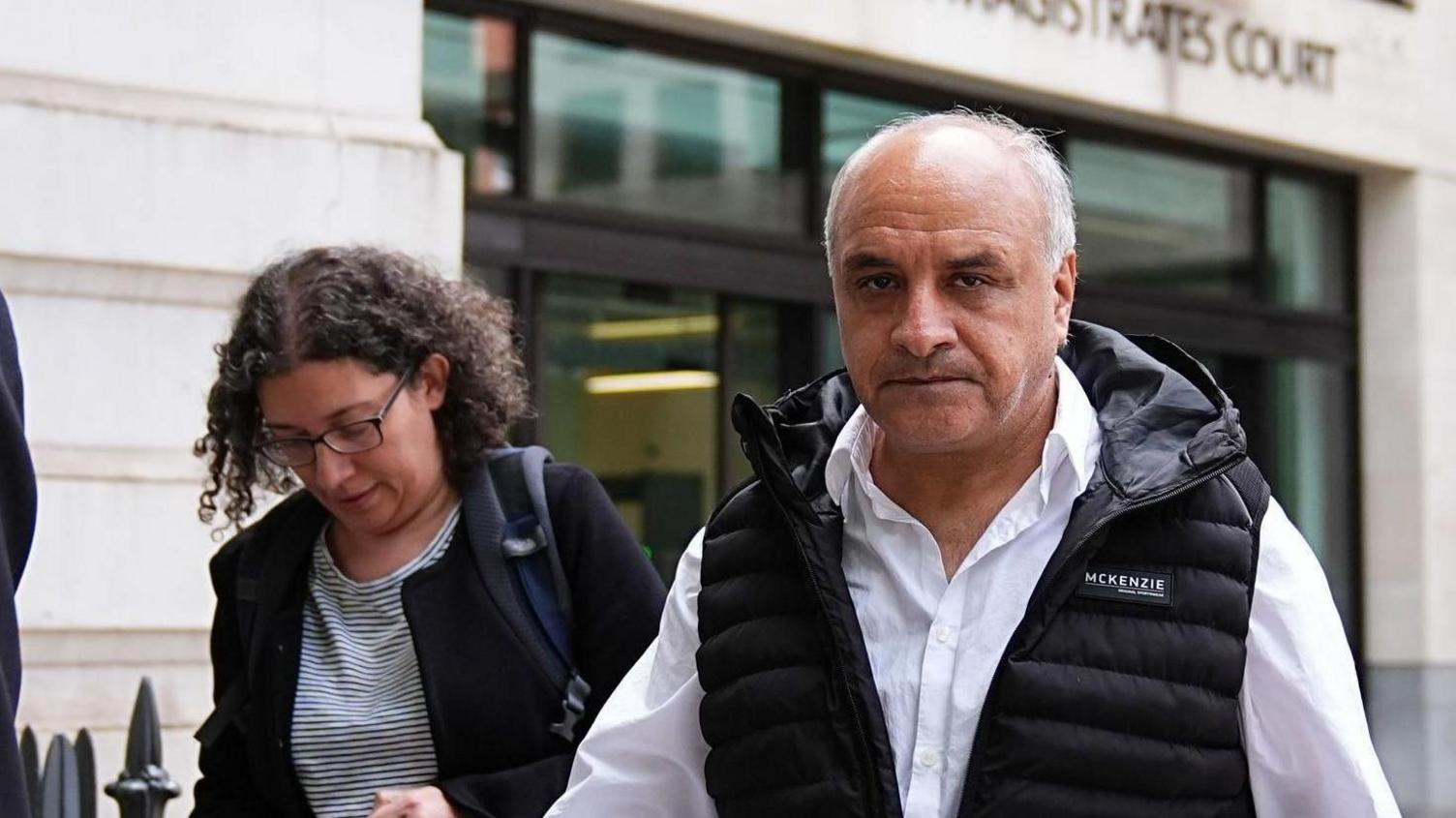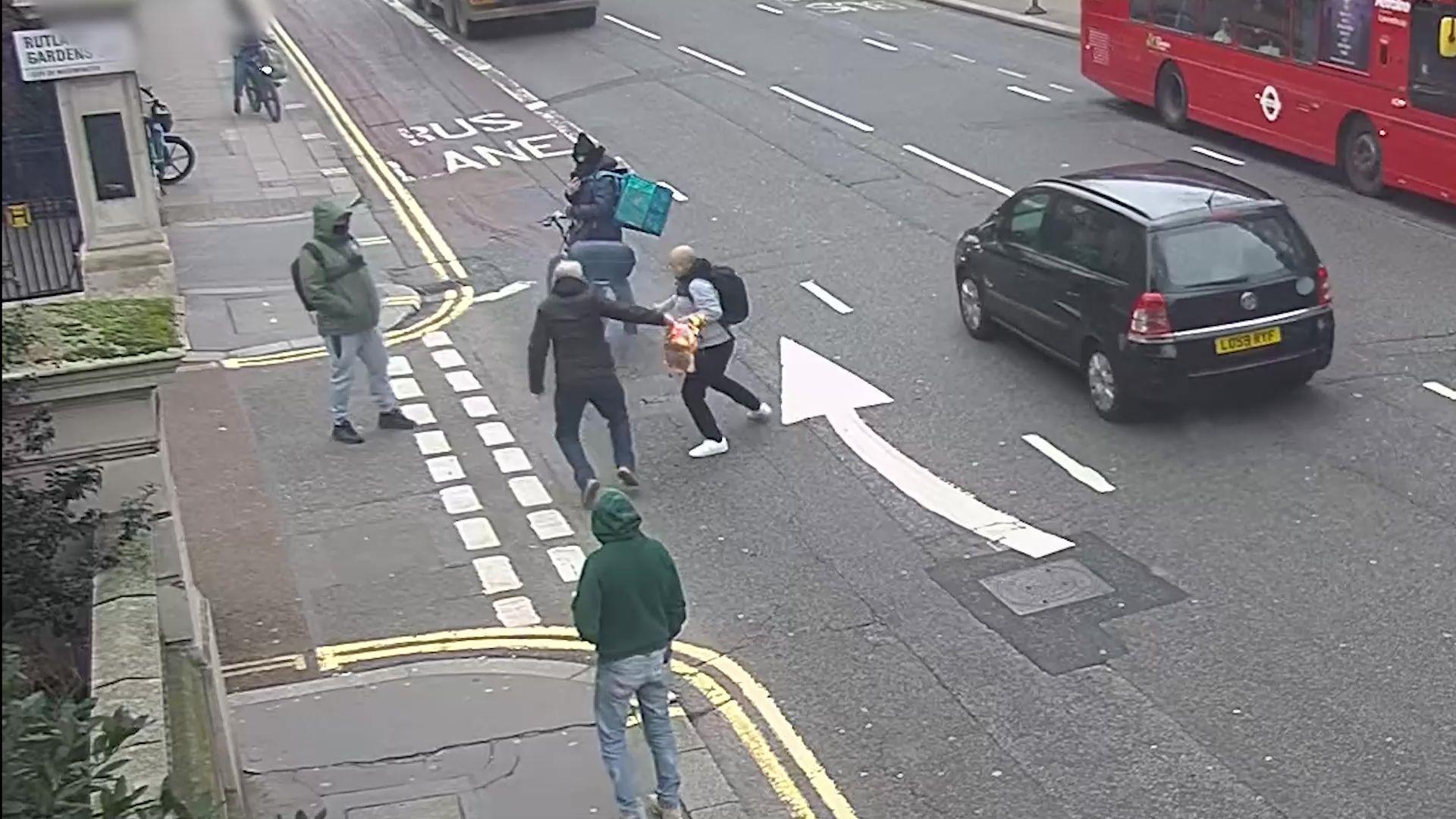Man appeals Quran burning with 'free speech'

Hamit Coskun was convicted at Westminster Magistrates Court in June
- Published
A man who was fined for burning a copy of the Quran outside the Turkish consulate in London was using his "human right to free speech" an appeal hearing has been told.
Hamit Coskun, 50, shouted abusive comments about Islam as he held the flaming book aloft in Rutland Gardens in Knightsbridge on 13 February.
In June he was found guilty at Westminster Magistrates Court of the offence and of using disorderly behaviour, and fined £240 with a statutory surcharge of £96.
District Judge John McGarva said Coskun's conduct was "provocative and taunting" and told him "you have a deep-seated hatred of Islam and its followers".
Coskun was found guilty of a religiously aggravated public order offence, having shouted "Islam is religion of terrorism" and "Quran is burning" while holding the flaming religious text.
The 51-year-old wrote posts on social media detailing his plan and saying it was to "protest the Islamist government" of Turkish President Recep Tayyip Erdogan, whom he claimed "has made Turkey a base for radical Islamists and is trying to establish a Sharia regime", the court heard.
He is appealing against his conviction under Section 5 of the Public Order Act, which criminalises acting in a "disorderly" manner, or displaying material that is likely to cause "harassment, alarm or distress" to others, as well as the finding his actions were religiously aggravated.

CCTV captured Moussa Kadri (second left), attacking a man burning a copy of the Koran outside the Turkish consulate
Tim Owen KC, speaking on behalf of Coskun, told the appeal hearing at Southwark Crown Court on Thursday his client's conduct was the legal exercise of his right to freedom of expression under Article 10 of the European Convention on Human Rights (ECHR) and was a "perfectly legitimate expression of his opinion on Islam".
"Mr Coskun making that protest outside the Turkish consulate as he did was attacking the institution of Islam, and the book," Mr Owen told the court.
Philip McGhee, appearing on behalf of the prosecution, told the hearing Coskun's action was "motivated, at least in part, by hostility towards followers of Islam".
Mr McGhee quoted social media posts written by Coskun prior to the incident, which said: "Koran is a book that orders terror, permits plunder, rape, paedophilia, and does not recognise the right to life for anyone outside the Islamic faith" and "Islam is a terrorist ideology".
Attacker of Quran-burning protester is spared jail
- Published23 September
Man fined for 'provocative' Quran burning
- Published2 June
Man denies religious offence over burning of Quran
- Published15 February
While he burned the holy book outside the Turkish consulate, Coskun was attacked by a man called Moussa Kadri, who came out of a residential building and told Coskun "I'm going to kill you", before returning and slashing at him with a knife.
Kadri later told police he was protecting his religion.
Mr McGhee said Coskun must have been aware that his actions may be disorderly and that Mr Kadri was "evidently distressed" by Coskun's actions before he went on to assault him.
The National Secular Society (NSS), which is funding Coskun's legal fees alongside the Free Speech Union (FSU), criticised Coskun's conviction as a repurposing of the public order act into "a form of modern blasphemy law".
Blasphemy was abolished as a common law offence in England and Wales in 2008.
The NSS chief executive Stephen Evans said the right to free speech "must include the right to offend".
"We're supporting Hamit Coskun's appeal not to endorse his actions, but to defend a vital principle - that free speech must include the right to offend," he said.
Turkey-born Coskun, who is half-Kurdish and half-Armenian, was originally charged with intent to cause "harassment, alarm or distress" against "the religious institution of Islam", the NSS said.
Following interventions by the NSS, the Crown Prosecution Service said the wording of the charge was "incorrectly applied" and substituted a new charge.
Last month, Coskun's attacker Moussa Kadri, 59, was handed a suspended sentence after pleading guilty to assault and having a bladed article in a public place.
The judge said he will be returning his ruling on Friday.
Listen to the best of BBC Radio London on Sounds and follow BBC London on Facebook, external, X, external and Instagram, external. Send your story ideas to hello.bbclondon@bbc.co.uk, external